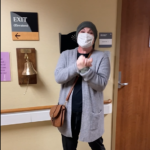Adding tafasitamab-cxix to rituximab and lenalidomide reduces the risk of progression or death over fifty percent for refractory or relapsed follicular patients.
In a recent interview, Dr. Laurie Sehn, British Columbia Cancer Centre professor explained to Healio News that there is currently no cure for the treatment of follicular lymphoma.
Follicular lymphoma is defined as a cancer occurring when whole blood cells become uncontrollable and form lumps in the organs or lymph glands. The front-line treatment has been chemoimmunotherapy. However, continued use eventually shortens that response.
Chemoimmunotherapy in follicular lymphoma combines chemotherapy drugs with immunotherapy agents. Whereas immunotherapy as a single agent, only relies on drugs that boost the immune system.
Researchers report the need for more effective programs to improve durability of response.
A New Treatment Option
Dr. Sehn and colleagues investigated the addition of tafasitamab-cxix in the 2L-MIND clinical trial (NCT02399085).
The trial included 548 adult patients averaging 64 years of age who had been diagnosed with CD19 and CD20 follicular lymphoma. All adult participants had received a minimum of one line of therapy.
Tafasitamab-cxix is a monoclonal antibody that targets the CD19 protein on B-cells.
FDA approval of lenalidomide combined with rituximab followed by tafasitamab maintenance was based on clinical trials that demonstrated significant improvements in progression-free survival when compared to rituximab as a single agent.
The final five-year follow-up results were presented at the 2023 AACR Annual Meeting.
The approval will benefit patients who have received prior treatment for marginal zone and follicular lymphoma.
The Primary Endpoint was progression free survival (PFS). Secondary endpoints included but were not limited to were safety, durable response, and overall survival.
A higher percentage of patients assigned to tafasitamab-cxix continued with their treatment at the cutoff (19%) vs placebo (15%). The progression free survival benefit extended to various subgroups including patients who had disease progression in the past 24 months.
Dr. Sehn said that considering these patients are in a harder to treat category, just the fact that they benefited as much as patients in the lower risk category bodes well for the combination therapy.
Dr. Sehn claimed that this is first study showing the value of the anti-CD19 antibody to anti-CD20. The doctor concluded by saying that CD19 is found on most B-cell lymphomas. Therefore, she believes additional trials are in order with the next step exploring and evaluating for other subtypes.
Source: www.healio.com
Editor’s Note: Get Involved
Cancer doesn’t discriminate. WHATNEXT and its partners are interested in amplifying the voices of those from all identities and backgrounds. If you have a cancer journey to share, reach out here to learn more about how your voice can help spread awareness and inspire individuals from all walks of life.
#follicularlymphoma #reducedrisk
Last modified: January 30, 2025







